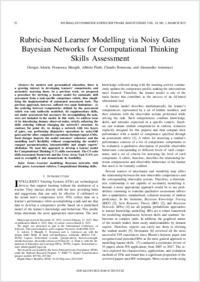Rubric-based learner modelling via noisy gates Bayesian networks for computational thinking skills assessment
- Adorni, Giorgia ORCID Istituto Dalle Molle di studi sull'intelligenza artificiale (IDSIA), Facoltà di scienze informatiche, Università della Svizzera italiana, Svizzera
- Mangili, Francesca ORCID Istituto Dalle Molle di studi sull'intelligenza artificiale (IDSIA), Facoltà di scienze informatiche, Università della Svizzera italiana, Svizzera
- Piatti, Alberto ORCID Department of Education and Learning (DFA), SUPSI, Lugano, Switzerland
- Bonesana, Claudio ORCID Istituto Dalle Molle di studi sull'intelligenza artificiale (IDSIA), Facoltà di scienze informatiche, Università della Svizzera italiana, Svizzera
- Antonucci, Alessandro ORCID Istituto Dalle Molle di studi sull'intelligenza artificiale (IDSIA), Facoltà di scienze informatiche, Università della Svizzera italiana, Svizzera
- 2023
Published in:
- Journal of communications software and systems. - 2023, vol. 19, no. 1, p. 52-64
Terms—Learner modelling
Bayesian networks with noisy gates
Assessment rubrics
Computational thinking skills
English
In modern and personalised education, there is a growing interest in developing learners’ competencies and accurately assessing them. In a previous work, we proposed a procedure for deriving a learner model for automatic skill assessment from a task-specific competence rubric, thus simplifying the implementation of automated assessment tools. The previous approach, however, suffered two main limitations: (i) the ordering between competencies defined by the assessment rubric was only indirectly modelled; (ii) supplementary skills, not under assessment but necessary for accomplishing the task, were not included in the model. In this work, we address issue (i) by introducing dummy observed nodes, strictly enforcing the skills ordering without changing the network’s structure. In contrast, for point (ii), we design a network with two layers of gates, one performing disjunctive operations by noisy-OR gates and the other conjunctive operations through logical ANDs. Such changes improve the model outcomes’ coherence and the modelling tool’s flexibility without compromising the model’s compact parametrisation, interpretability and simple experts’ elicitation. We used this approach to develop a learner model for Computational Thinking (CT) skills assessment. The CT-cube skills assessment framework and the Cross Array Task (CAT) are used to exemplify it and demonstrate its feasibility.
- Collections
- Language
-
- English
- Classification
- Computer science and technology
- License
- Open access status
- gold
- Identifiers
-
- DOI 10.24138/jcomss-2022-0169
- ARK ark:/12658/srd1326776
- Persistent URL
- https://n2t.net/ark:/12658/srd1326776
Statistics
Document views: 113
File downloads:
- Adorni_2022_jcomss: 129
